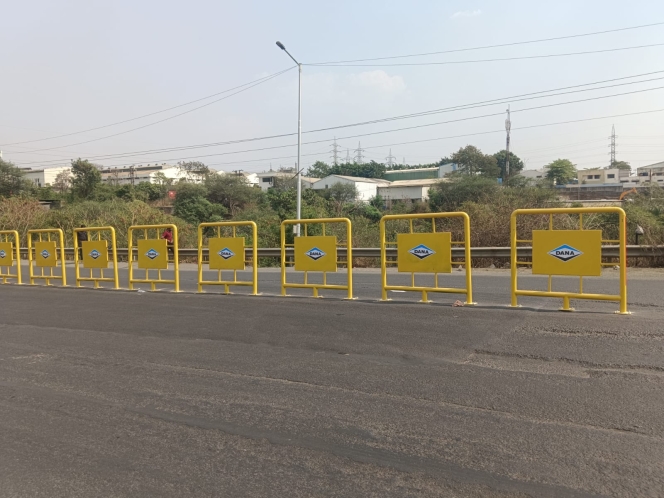Dana India Completes CSR Initiatives In Chakan, Pune
- By MT Bureau
- December 13, 2024

Dana India has announced the completion of its Corporate Social Responsibility (CSR) initiatives in Chakan, Pune. The initiatives aimed at improving road safety and infrastructure in accident-prone areas and reiterates Dana India’s vital role in promoting sustainable development and community safety, both in Maharashtra and across India.
In an effort to lower the risk of accidents for over 3,600 residents and tourists, Dana India built 30 tall solar lighting at Chakan's Alandi Phata Chowk. This project is in line with the Sustainable Development Goals (SDGs) of the UN, including Goal 13: Climate Action and Goal 7: Affordable and Clean Energy. Additionally, Dana India put up metal barriers and traffic safety signs in the industrial region of Chakan. Approximately 250,000 commuters are anticipated to benefit each day from these actions, which also support Goals 11: Sustainable Cities and Communities and 17: Partnerships for the Goals.
More than 300,000 individuals now have better road visibility and safety thanks to the installation of road divider railings at strategic locations like Endurance Chowk. This programme promotes Goal 3: Well-being and Good Health. Goal 7: Accessible and Sustainable Energy Goal 17: Partnerships for the Goals and Goal 15: Life on Land. In order to significantly improve evening safety for an estimated 300,000 people, Dana India additionally installed street lighting in strategic areas across Endurance Chowk and the Chakan Industrial Area. These initiatives support both Goal 15: Life on Land and Goal 11: Sustainable Cities and Communities.
Gajanan Gandhe, Country Head and Vice President, Dana India, said, “These initiatives represent a significant step towards improving road safety and promoting sustainability in the Chakan community. At Dana India, we are committed to driving meaningful change and enhancing the quality of life for the people of Pune while supporting the global sustainability agenda.”
Renault Group to Unveil futuREady Strategic Plan
- By MT Bureau
- March 04, 2026

Renault Group CEO François Provost and the management team will present a new strategic plan, ‘futuREady’, on 10 March 2026 at the Technocentre Renault in Guyancourt. The plan is designed to address changes in the automotive industry and establish a resilient business model.
The strategy focuses on transitioning the company from a ‘success story’ to a ‘success system’ through innovation and operational excellence. The Group intends to maintain a product offensive across its three brands to stimulate demand in Europe and high-growth international markets.
The futuREady plan emphasises the optimisation of management resources and the acceleration of production cycles. By anticipating market expectations and strengthening delivery efficiency, the Group aims to increase value and desirability across its portfolio.
Renault Group is preparing to open a new chapter in its history with futuREady, its strategic plan, designed to respond to the profound upheavals in the automotive industry and prepare the Group for a context that is more uncertain than ever. Building on its recent successes, the company will remain on the offensive with 'winning' products for each of its three brands, thus triggering a new dynamic in Europe and a targeted offensive in high-growth markets outside of Europe. futuREady is based on accelerating innovation throughout the company to anticipate market expectations. Being futuREady also means being at the top level on everything that can be controlled, by strengthening operational excellence: optimizing, accelerating and delivering efficiently to build a resilient model. The objective of the plan is clear: to move from a success story to a success system, designed to last.
Hindustan Zinc Attains 26.3% Women Workforce Representation
- By MT Bureau
- March 04, 2026
Hindustan Zinc (HZL) has recorded 26.3 percent women representation across its workforce, according to a company announcement. This figure marks the highest gender diversity level in India’s metals and mining sector.
The company employs over 745 women professionals, with 314 serving as engineers or in equivalent technical roles. Women at the company are currently involved in frontline operations, including underground mining, smelting, lead mine rescue and heavy machinery operation.
Hindustan Zinc has implemented Industry 4.0 practices, including robotics, automation and tele-remote underground operations, to standardise processes. These technologies have enabled the inclusion of women in night shifts and underground roles traditionally dominated by men.
Key workforce milestones and initiatives include:
- Frontline Roles: Women operate heavy machinery and manage night shifts in both mining and smelting units.
- Mine Rescue: The company has formed an all-women underground mine rescue team.
- Digital Infrastructure: Operations use drone-based surveillance and remote blasting systems to enhance safety.
- Workplace Policies: HZL offers a one-year childcare sabbatical, a spouse hiring policy, and work-from-home flexibility.
The company has launched a 25-day campaign titled “She Knows the Ground She Stands On” to encourage women to pursue careers in STEM and mining. As part of this initiative, 15 women from science institutions were invited to visit the company’s mining ecosystem to engage with operational teams and digital technologies.
Arun Misra, CEO, Hindustan Zinc, said, “Empowering women in mining is not merely a matter of equity, it is a strategic imperative for the future of the industry. At Hindustan Zinc, a culture has been cultivated where women lead from the front—whether operating underground mines, driving automation, or advancing sustainable metallurgy. ‘She Knows the Ground She Stands On’ reflects a commitment to challenging outdated norms and ensuring that every capable woman has the opportunity to grow and excel. As the company works toward achieving 30% diversity by 2030, the focus remains on building a workplace where inclusion fuels innovation and gender is never a barrier to excellence.”
The company aims to reach a 30 percent diversity target by 2030. The current campaign is scheduled to conclude on 8 March 2026
- BYD
- Chinese Corporate of the Year
- China-Britain Business Council
- China-Scotland Business Awards
- Chinese Burns Supper
BYD Named Corporate Of The Year At China-Scotland Business Awards
- By MT Bureau
- March 03, 2026

BYD has been named as Chinese Corporate of the Year at the China-Britain Business Council’s annual China-Scotland Business Awards held at a recent ceremony in Edinburgh. The accolade was presented during the CBBC’s Chinese Burns Supper, an event now in its 13th year and firmly established in the bilateral business calendar.
This particular award recognises the significant contribution of Chinese enterprises to the Scottish economy. The council specifically highlighted BYD’s substantial influence in advancing the sustainable growth of the New Energy Vehicle sector within the Scottish market, alongside the company’s impressive UK-wide sales performance, which has now surpassed 50,000 vehicles. Liam Howel, Deputy Head of Retailer Marketing for BYD UK, accepted the award on behalf of the company.
The China-Britain Business Council, serving as the UK’s premier business network for fostering trade and investment with China since 1954, acts as an independent voice for business, providing members with essential advice, analysis and access to opportunities.
Beyond the awards, the evening also served a charitable purpose, raising funds for the Migrant Children’s Foundation, an organisation dedicated to enhancing the lives and educational opportunities of underprivileged children in China through various health and learning initiatives.
Bono Ge, Country Manager, BYD UK, said, “It’s a huge privilege for BYD to have been presented with this award. Receiving this recognition is further endorsement that BYD is pushing in the right direction; we are not only producing cars which appeal to buyers and buses that keep the public transport sector moving but further forwarding the move towards sustainability via our energy storage solutions. Most of all, we are creating a business that supports local jobs both in Scotland and the rest of the UK.”
Panasonic Automotive Systems To Rebrand As Mobitera Inc.
- By MT Bureau
- March 01, 2026

Japanese tier 1 supplier Panasonic Automotive Systems Co., has announced it will change its corporate name and brand to Mobitera Inc., effective 1 April 2027. The rebranding follows a strategic partnership formed in December 2024 with the Apollo Group, aimed at strengthening software development and optimising the company's business portfolio.
The transition to Mobitera represents the company's focus on the evolution of the in-vehicle cockpit space. The new name combines ‘mobility’ with the Latin ‘iter’ (path) and the Japanese ‘terasu’ (to illuminate).
The organisation is pivoting to meet market demands by prioritising software capabilities alongside its hardware legacy. The company’s mission has been defined as creating a sustainable mobility society, supported by a vision titled ‘Joy in Motion.’
The new logo features a central ‘I’ intended to symbolise a focus on individuals. The corporate colour, ‘Mobitera Blue-Green,’ has been selected to represent the harmonisation of society and the environment.
Masashi Nagayasu, Chief Executive Officer, Panasonic Automotive Systems, said, “Mobitera reflects our vision to power the future of mobility with our high-quality technologies that elevate and enrich the human experience. As we evolve our organisation to meet the needs of today’s rapidly changing market, we are committed to staying true to the core values that have long defined who we are.”
| Before change: | After change: |
| Panasonic ITS Co., Ltd. | Mobitera ITS Inc. |
| Panasonic Automotive Systems India Pvt. Ltd. | Mobitera India Pvt. Ltd. |
| Panasonic Automotive Electronics Co., Ltd. | Mobitera Solutions Inc. |
| Panasonic System Networks Evaluation Technology Co., Ltd. | Mobitera Evaluation Technologies Inc. |
| Harima SANYO Industries Co., Ltd. | Mobitera Wel Inc. |
| Panasonic Automotive Systems America, LLC | Mobitera America, LLC |
| Panasonic Automotive Systems de Mexico S.A. de C.V. | Mobitera De Mexico, S.A de C.V. |
| Panasonic Automotive Systems Reynosa Mexico S.A. de C.V. | Mobitera Reynosa Mexico, S.A de C.V. |
| Panasonic Automotive Systems Monterrey Mexico S.A. de C.V. | Mobitera Monterrey Mexico, S.A. de C.V. |
| Panasonic Automotive Sales Company de Mexico, S.A. de C.V. | Mobitera Sales Company de Mexico, S.A. de C.V. |
| Panasonic Automotive Shared Services Company Mexico, S.A. de C.V. | Mobitera Shared Service Company Mexico, S.A. de C.V. |
| Panasonic Automotive Systems Europe GmbH | Mobitera Europe GmbH |
| Panasonic Automotive Systems Czech, s.r.o. | Mobitera Czech, s.r.o. |
| OpenSynergy GmbH | No change |
| Panasonic Automotive Systems Asia Pacific Co., Ltd. | Mobitera Asia Pacific Co., Ltd. |
| Panasonic Automotive Systems Malaysia Sdn. Bhd. | Mobitera Malaysia Sdn. Bhd. |






Comments (0)
ADD COMMENT